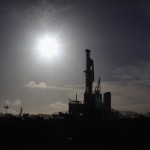With Gas Drilling on the Decline, Texas Shale Regions Diverge
Two years ago Texas’ booming Barnett Shale region was facing a slew of challenges that came along with increased oil and gas drilling. Heavy drilling trucks were destroying the roads, employees were getting poached from their everyday jobs to go work on the rigs, and residents of North Texas worried about what kind of impact all that drilling was having on the environment.
Those problems persist. But as the price of natural gas has declined, much of the drilling activity has moved south, to the Eagle Ford Shale region, where drillers can extract more valuable crude oil and liquids from the ground.
“What I hear in my district is, we miss those high natural gas prices now that its down, because the drilling is substantially, substantially reduced,” State Representative Phil King, R-Weatherford, said at a a recent panel of lawmakers hosted by StateImpact Texas. “We enjoy not having the congestion, but people are missing not making as much money.”
During the event King pointed to the changing realities of the Barnett Shale, which lead the way in using hydraulic fracturing, or fracking, to drill for fossil fuels, but has been eclipsed in profitability by the Eagle Ford. At times sounding like a battle-tested veteran, he offered advice to the lawmakers in the newer, more active shale play to the south.
When it came to the challenge of damaged roads, he left the door open for a proposal from State Senator Carlos Uresti, D-San Antonio, (who represents parts of the Eagle Ford) to take money from the Rainy Day Fund to repair roads.
But King said he was unsure what good it would do. “We fought that, and it’s still a struggle. One of the problems you run into is, if you repair them, they just get torn up again,” he said.
The low cost of gas also prompted him to speak out against a proposal from Sen. Rodney Ellis that could lead to a reduction of tax breaks for drilling companies.
“Our problem is, the prices of natural gas have gone so low, that it’s very, very difficult for someone to drill a well and even break even on it,” King said. “So from my perspective, we still need that incentive to offset the cost of those very expensive Barnett Shale wells.”
